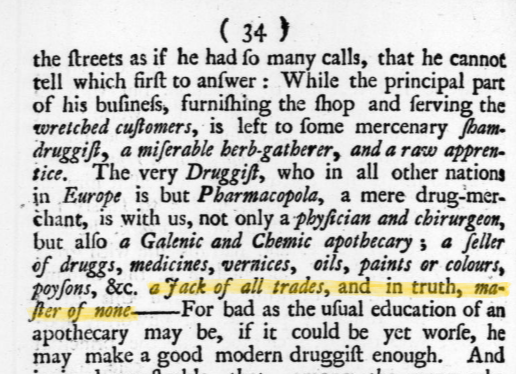Question More

Last week I talked about cultivating boredom as part of my current quest to improve my ability to focus. I won’t say I’ve been very successful at being bored this week—played way too much WoW—but I did my best. That said, being stuck in the ER for eleven hours with a dwindling phone battery did help a bit.
Anyway, aside from attempting to scroll less, I’ve also been trying to question things more.
In an age where information is easier to get than ever, I find that misinformation is just as rampant.
Last night I read a newsletter that had a section about generalists (people with a variety of knowledge/skills across many areas) and the advantages of being a generalist over a specialist in the age of AI. It was a very good read overall, but as part of his argument the author mentioned that many people like to use the quote “from Shakespeare” about how a “jack of all trades is a master of none” but that the full quote actually finishes with “but oftentimes better than a master of one.”
I’d never heard this so I found it interesting. But was it actually a Shakespeare quote? Why did I not know that? I decided to look it up. I really wanted to find the full context. So I went down a rabbit hole on the history of the phrase and discovered that it’s not by Shakespeare at all, and also that the last part—“oftentimes better than a master of one”—is a modern addition.
According to Gary Martin of Phrase Finder, the earliest example of the phrase “jack of all trades, master of none” is from a 1785 pamphlet written by Charles Lucas called Pharmacomastix, or the Office, Use, and Abuse of Apothecaries Explained. (Note: when I looked it up, I learned the pamphlet was actually published in 1741).
Thanks to archive.org I found the phrase on page 34:

While the main part of his business — stocking the shop and serving the unfortunate customers — is left to some hired pretender of a druggist, a poor herb-gatherer, and an inexperienced apprentice, the very Druggist, who in all other nations in Europe is but Pharmacopola, a mere drug-merchant, is with us, not only a physician and chirurgeon, but also a Galenic and Chemic apothecary; a seller of druggs, medicines, vertices, oils, paints or colours poysons, &c. a Jack of all trades, and in truth, master of none.
The reason it’s likely attributed to Shakespeare is that back in 1592, writer Robert Greene published a pamphlet called Groats-worth of Witte, The repentance of Robert Greene in which he writes:

Yes trust them not: for there is an upstart crow, beautified with our feathers, that with his Tygers hart wrapt in a players hyde, supposes he is as well able to bombast out a blanke verse as the best of you: and Beeing an absolute Johannes factotum, is in his owne conceit the onely Shake-scene in a countrey.
He was talking about a young William Shakespeare here. This statement clearly didn’t age well.
“Johannes factotum” was a Latin term used to imply that someone was trying to do too much and therefore doing nothing well as a result.
So it’s not that Shakespeare coined the phrase “jack of all trades, master of none” it’s that a different writer shaded him and accused him of being one.
Anyway, I found all of this very fascinating so I’m glad I took the time to question it. I now pass this knowledge on to you.
Note: This, too, may contain errors and if you find them please let me know.